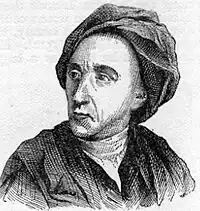The Temple of Fame
The Temple of Fame: A Vision is an eighteenth-century poem by Alexander Pope, directly inspired by Geoffrey Chaucer's fourteenth-century poem The House of Fame (Hous of Fame in the original spelling). First published in 1715,[1] the poem comprises 524 lines which, like Chaucer's original version, take the form of a dream vision. The poem's precise date of composition is ambiguous, but Pope asserted that it was composed in 1711[2] even though its initial publication was implied by a letter from Pope to Martha Blount, written in 1714, in which he referred to the poem as ‘just out.’ Eventually the work was classified by the poet himself as a ‘juvenile poem’ among his earlier translations and imitations.[3]

Alexander Pope, author of The Temple of Fame.
References
- Pope, Alexander. The Temple of Fame: A Vision. London: Printed for Bernard Lintott, 1715. Print.
- '"The Temple of Fame. Paraphrases from Chaucer." The Temple of Fame. Paraphrases from Chaucer. Alexander Pope. 1903. Complete Poetical Works. Bartleby.com, n.d. Web. 05 May 2016. <http://www.bartleby.com/203/23.html>.
- '"The Temple of Fame. Paraphrases from Chaucer." The Temple of Fame. Paraphrases from Chaucer. Alexander Pope. 1903. Complete Poetical Works. Bartleby.com, n.d. Web. 05 May 2016. <http://www.bartleby.com/203/23.html>.
External links
Wikisource has original text related to this article:
- Full source text available at University of Michigan Digital Library.
- Full text: "Paraphrases from Chaucer: The Temple of Fame" at Bartleby.com.
- "Alexander Pope" at the Academy of American Poets.
- "Alexander Pope" at the Poetry Foundation.
- More Chaucer-related resources.
This article is issued from Wikipedia. The text is licensed under Creative Commons - Attribution - Sharealike. Additional terms may apply for the media files.
